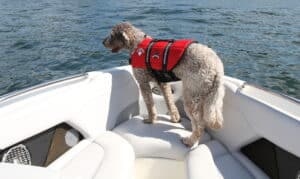When raising a young dog, you will seek out all kinds of information that help you understand how to feed your puppy, housebreak, and groom. Today we want to touch on how to get your dog to experience positive social training.
Growing into adulthood is an important topic that must be taken into consideration. While even wolves in the wild will grow to maturity with no human help all, it is necessary for your new puppy to learn a certain sociability, an aptitude and desire to be with and around people, and to accept his master’s word as law.
Proper Socialization Is not accidental
This socialization is accomplished by design, not by chance, but rather by studious, hard work, and clever handling. Exposing a dog too many different stimuli and gently, calmly, guiding him through each new experience will serve to create a confident, healthy, socially acceptable canine.
The spooky puppy, the nervous biter, the dog who backs away when approached, and many other canines who behave in unacceptable fashions were created by neglect or bad handling; neglect on the part of their masters to teach them to what the world has in store. Often these poor, neurotic dogs are filed as the sad status of “outdoor dogs” since they have become uncontrollable under living conditions as pets.
Good socialization includes exposure to noises, strange people and places, other dogs, kids, travel, and other such stressful situations. Puppies may be nervous about strange and unknown things. Their fear may be demonstrated by barking, backing away, crying, or acting with aggression.
Consoling your dog, talking to him softly, giving praise, and coaxing him to explore the nervous-making object or person will instill in them that there is nothing to fear.Every time he overcomes his anxiety, new self-confidence is developed and he will find his next unfamiliar situation less frightening.
His experiences with people should be treated in the same fashion. Many dogs are quite comfortable with all types of folk, big or small, but just as many are scared when presented with unfamiliar faces. Ask strangers and children to greet the puppy, to pet him and gently encourage him to make friends. Kneeling to his level or sitting beside him on the floor will eliminate some of the fear he might feel by their mere size or quickness of the children’s movements.
One Last Word About kids…
Very small children should be allowed to play with animals only under adult supervision. A dog is not a stuffed animal and should the child be rough with him, the animal could be irrevocably damaged regarding his socialization to all children in the future. Therefore, if your child is too small to understand the concept of gentleness, wait before bringing a little puppy into the home or you may want to consider buying an adolescent puppy (4 to 9 months old) rather than an infant one.





